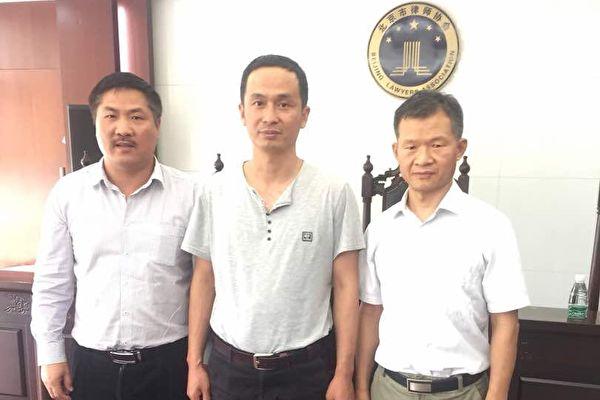Within a judicial system that lacks rule of law, a simple hearing turned violent when Chinese police prevented a Hong Kong journalist from reporting on the scene.
Chui Chun-ming, a cameraman for Now TV, a paid-TV service provider in Hong Kong, was in Beijing to cover a disciplinary hearing for Xie Yangyi, one of the human rights lawyers who was arrested in the “709 incident” in 2015, when hundreds of lawyers were rounded up across the country. Many were detained and interrogated by Chinese authorities.
Chui was wrestled to the ground by the police. He had some bleeding in his head, while his hands and knees were bruised, according to a report by Now TV. He was then forced into a police car and detained for several hours. Later, he was forced into signing a “statement of repentance,” where he admitted he had overreacted when the police approached him for his ID.
Xie’s wife, Yuan Shanshan, told Hong Kong broadcaster RTHK that when his husband stepped in and demanded that Chui’s ID be returned, Xie was also beaten by the police, his neck bruised with scratch marks. The police also forced him into a police car, and took him to his hearing at the Beijing Lawyers Association.
Sui Muqing, a human rights lawyer from Guangzhou, a metropolis in southern China, wrote on his Twitter account that he tried to attend Xie’s hearing, but the association claimed that it was an internal hearing and not open to the public.
“The hearing itself is only a show for giving out an illegal punishment,” said Sui, adding, “the fact that people were not allowed to listen in [at the hearing] shows that the Chinese authorities feel guilty. It is a form of persecution.”
Lu Tingge, human rights lawyer from northern China’s Hebei Province, noted that the Chinese police violated the law by hampering the cameraman’s interview and physically assaulting a lawyer.
Falun Gong
Xie was called in for a disciplinary hearing because he took up the case of Xie Yiqiang (no relation), a senior engineer from northern China’s region of Ningxia, who is a Falun Gong adherent.Falun Gong, also known as Falun Dafa, is an ancient Chinese spiritual discipline with slow meditative exercises and moral teachings. The discipline was hugely popular during the 1990s in China, when the number of practitioners reached 100 million, according to official estimates. In 1999, then-Chinese Communist Party leader Jiang Zemin ordered a nationwide persecution of the group.
Since then, millions of adherents have been arrested and detained in prisons, brainwashing centers, and forced labor camps, according to the Falun Dafa Information Center.
Xie Yiqiang, who began practicing Falun Gong in 1996, has been imprisoned for more than seven years for his beliefs, according to Minghui.org, a website dedicated to the reporting of persecution of Falun Gong in China.
“I refused to give up my belief. So they used sticks to open up my eyes and prevent me from sleeping. They inserted sticks into my nostrils. They rolled back my eyelids and flicked my eyeballs,” Xie Yiqiang told Minghui.org, recalling how he was tortured while incarcerated at the Yinchuan Prison in Ningxia. He was released at the end of 2012 after serving a four-year sentence.
In September 2016, Xie Yiqiang was again abducted by police. He was sentenced to two years and four months in prison. Later, he hired Xie Yangyi as one of his defense lawyers to appeal his sentence. But the appeal was unsuccessful. The court gave him a longer sentence, of three years and six months in August 2017. Xie Yiqiang filed another appeal two months later.
On May 7, Xie Yangyi received a notice from the Beijing Lawyer Association asking for his presence for a disciplinary hearing.
Condemnation
In Hong Kong, many condemned how Chui the cameraman was treated in Beijing.“This [incident] is a complete failure to understand that under ‘one country, two systems,’ Hong Kong’s media should receive the most basic protection,” pro-democracy lawyer Claudia Mo told online publication Hong Kong Free Press (HKFP), referring to the doctrine that was supposed to guarantee Hong Kong’s independent governance after the city was returned to Chinese sovereignty in 1997.
Kwok Ka-ki, a lawmaker from the Civic Party, warned that Hong Kong journalists may have to stop covering news in China—as the violent attack on Chui has demonstrated the dangers that they face, reported Hong Kong media The Standard. Kwok also criticized the Hong Kong government for failing to openly condemn the attack.
“The [Hong Kong] government should approach the Beijing government to ensure that freedom of the press can be assured in the mainland,” said Wu Chi-wai, chairman of the Democratic Party.





